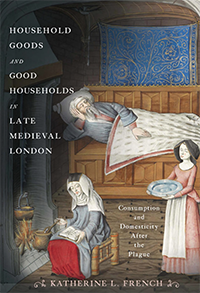Looking for a juicy, non-fiction book to immerse yourself in during the last days of Winter?
We have the perfect recommendation: “Household Goods and Good Households in Late Medieval London: Consumption and Domesticity After the Plague”, our newest addition to the Non-Fiction Library. Written by Katherine French, Professor of History at the University of Michigan, this book is a fascinating look at how every-day people lived and set up their households in medieval London. Members of the American Branch may remember that Professor French gave the Morris McGee Memorial Lecture at our 2018 General Membership Meeting (GMM) in Detroit. That lecture formed part of the basis of this book, and hopefully reflects positively on the quality of speakers at our GMMs.
The Black Death that arrived in the spring of 1348 eventually killed nearly half of England’s population. In its long aftermath, wages in London rose in  response to labor shortages, many survivors moved into larger quarters in the depopulated city, and people in general spent more money on food, clothing, and household furnishings than they had before. Household Goods and Good Households in Late Medieval London looks at how this increased consumption reconfigured long-held gender roles and changed the domestic lives of London’s merchants and artisans for years to come.
response to labor shortages, many survivors moved into larger quarters in the depopulated city, and people in general spent more money on food, clothing, and household furnishings than they had before. Household Goods and Good Households in Late Medieval London looks at how this increased consumption reconfigured long-held gender roles and changed the domestic lives of London’s merchants and artisans for years to come.
Grounding her analysis in both the study of surviving household artifacts and extensive archival research, Katherine L. French examines the accommodations that Londoners made to their bigger houses and the increasing number of possessions these contained. The changes in material circumstance reshaped domestic hierarchies and produced new routines and expectations. Recognizing that the greater number of possessions required a different kind of management and care, French puts housework and gender at the center of her study. Historically, the task of managing bodies and things and the dirt and chaos they create has been unproblematically defined as women’s work. Housework, however, is neither timeless nor ahistorical, and French traces a major shift in women’s household responsibilities to the arrival and gendering of new possessions and the creation of new household spaces in the decades after the plague.
Members of the American Branch can borrow this book by contacting our non-fiction librarian at researchlibrary@r3.org.

 response to labor shortages, many survivors moved into larger quarters in the depopulated city, and people in general spent more money on food, clothing, and household furnishings than they had before.
response to labor shortages, many survivors moved into larger quarters in the depopulated city, and people in general spent more money on food, clothing, and household furnishings than they had before.